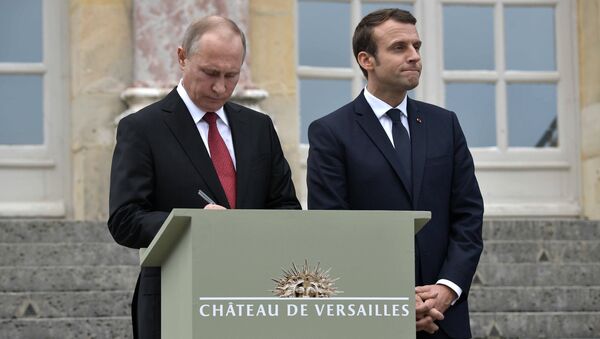The two leaders discussed a variety of important issues, including the Syrian and Ukrainian crises, the situation in Korea, the fight against terrorism, and the cultural and economic ties between Russia and France.
Igor Ignatchenko of the Russian Presidential Academy of National Economy and Public Administration told RT that the very fact that this meeting took place was a breakthrough.
"This meeting is a significant achievement by itself. Dialogue is especially important right now, considering how the relations between Russia and France came to a dead end during Francois Hollande’s presidency," Ignatchenko said.
According to him, now there’s a chance for a reset in relations between the two countries, which would be "on the best interests of both the Russians and the French".
Ignatchenko also added that Macron’s decision to engage in dialogue with Russia and to positively respond to proposals brought forward by Moscow stems from the fact that this is what the majority of French people want.
"By giving their votes to Macron’s opponents, 70 percent of the French people voted for normalizing relations with Russia, because Fillon, Le Pen, Melenchon – all of them spoke about the need to improve relations with Russia," Ignatchenko explained.
Meanwhile, Sergei Fyodorov of the Russian Academy of Sciences’ Institute of Europe remarked that the French leader’s eagerness to forge special relations with Russia on the Syrian issue was caused by a threat common to both Russia and France – terrorism.
"Macron said earlier that the isolation of Russia by the West and Europe in particular had led to the latter being excluded from the process of resolving the Syrian crisis, while in the current situation, the fight against terrorism has become an issue of utmost importance," Fyodorov said.
Both Putin and Macron admitted that Moscow and Paris still do not see eye to eye on a number of issues. However, Pavel Timofeyev of the Russian Academy of Sciences’ Institute of World Economy and International Relations said that the results of the meeting in Versailles should be regarded with cautious optimism.
"I would evaluate the results of this meeting with cautious optimism, as the presidents were able to find common ground, issues that will help forge further dialogue," Timofeyev said.
His assessment was echoed by Ignatchenko, who pointed out that the negotiations will definitely be a difficult and arduous process, but the fact that the two sides established a dialogue is a good thing in and of itself.
"The French leadership assumed a very tough stance on Syria, Ukraine and sanctions, but at least the very fact that the negotiations process was launched is a good thing," Ignatchenko surmised.




